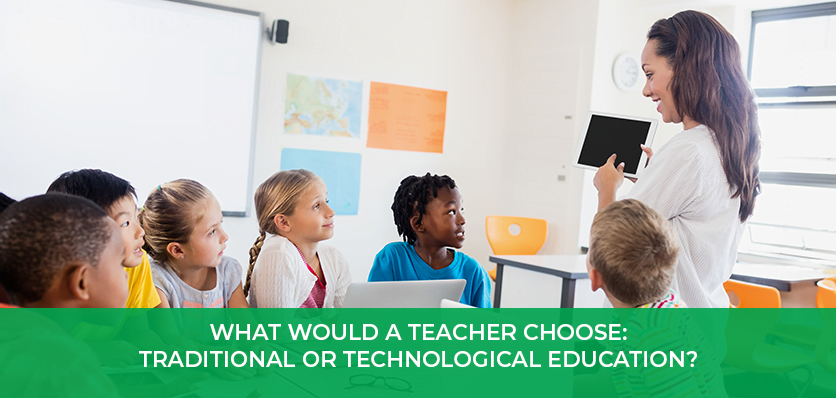 When we say education, our minds instantly shift to an image of a classroom with a teacher standing in front of at least 15 students or a higher number if the image is from a university lecture! This traditional image of teaching contradicts how many feel about technology being involved in the teaching process. Some can confidently say that teachers won’t be needed as much as before in schools or universities now that technology is in the process of getting involved in everything; others will claim that technology is downfall of the proper education that we need nowadays, but what do teachers themselves feel about technology driving a big portion of the daily teaching job they do?
When we say education, our minds instantly shift to an image of a classroom with a teacher standing in front of at least 15 students or a higher number if the image is from a university lecture! This traditional image of teaching contradicts how many feel about technology being involved in the teaching process. Some can confidently say that teachers won’t be needed as much as before in schools or universities now that technology is in the process of getting involved in everything; others will claim that technology is downfall of the proper education that we need nowadays, but what do teachers themselves feel about technology driving a big portion of the daily teaching job they do?
The teaching process is an integral part of the education system and teachers are a very important puzzle piece that complete the whole picture; whether we adopt a traditional education system or integrate technology in it, we should admit that teachers are and will remain an indispensable element of the system. That’s why their input and remarks that can be used to better develop educational technology and alter it to suit individual needs are of utmost importance.
Many surveys were conducted among teachers from different countries who teach different students age groups from K-12 to higher education to get a glimpse of how teachers feel about the use of technology in classroom and how they perceive technological education. In a survey conducted in the United States, 41% of educators stated that digital devices are helpful to students’ education. Also, in 2018 Teaching with Technology Survey, 4 in 5 teachers said that technology made their jobs easier and most of them felt that technology had a positive impact on teaching and learning.
We made our own version of technology in education survey, which was answered by K-12 teachers, university teaching assistants, and university teachers, and it confirmed what we thought. Teachers love technology! More than 90% of educators who answered our survey use some type of technology assistance in their classroom, and more than 70% of teachers said that their schools/universities offered them these technological tools and solutions.
According to Shymaa Eissa and Engy Yasser, technology makes their teaching process easier, while Safaa Sayed said that using technology enabled her to create a learning environment that is productive and enjoyable and helped her apply various teaching methodologies that benefited students of different variable intelligences. Furthermore, Omnia Mostafa and Farah Mohamed agreed that technological involvement in the teaching process benefited them in keeping their learners engaged and in peaking their interest. Another key point that’s often overlooked is Amena Nadeem’s. She says that using technology is environmentally friendly by consuming less papers and that technology in education helps in saving time both for her and for her students, which Amal Mohamed agrees with and adds that technology in education can trigger creativity and generating ideas. One advantage of using technology in education to Salma Ezzeldin is its convenience, with any piece of information a click away! In addition, Eman Elbehiry finds that use of technology in classroom is valuable in making sure that students understand the same piece of information using various delivery techniques that suit different types of intelligence, which Abanoub Karmey agrees with, although using technology isn’t applicable in his classroom. Moreover, Huda Adel points to a very important value of education technology, which is being connected all the time; students get instant feedback on their educational levels and teachers are always online which promotes continuous learning.
Accordingly, one competency we agree that today’s educators need to have in an optimum state is technological literacy, and because education technology can vary in complexity, teachers should be open to continuous development. While the use of technology in classroom can be an onerous and exhausting process for the teachers at first, over time all students will grasp what they have to do themselves and many of the tedious exhausting teacher tasks will be simpler.
In conclusion, many of today’s teachers believe that technology in education has created a boost in the learning process and made teachers’ jobs a lot easier than before. This gave teachers the time and capacity to focus more on the students’ individual needs. Finally, we believe that educational technology is an upgrade to the education system that fits the current world with the proper application and preparation.
P.S. If you haven’t read our first article of this series about perspectives on educational technology, here it is: In a Digital World: Traditional or Technological Education? Stay tuned for the upcoming article in our series to discuss what parents think of technological education!